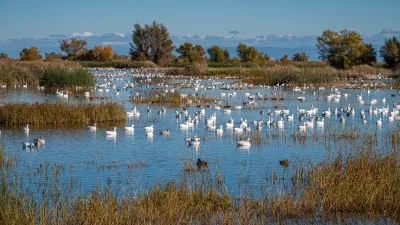First came plastic bags, then styrofoam cups, and now, plastic water bottles—though the ban is not as far-reaching as the former two in that it is restricted to sales on city property, including street fairs.

"During the next four years, the ban will phase out the sales of plastic water bottles holding 21 ounces or less on city property, indoor or outdoor, which will impact park vendors, food truck operators, street fairs and places like the Moscone Center convention facility. Waivers are permissible if an adequate alternative water source is not available," writes Joshua Sabatini.
As far-reaching as the ban may be, San Francisco is not the first to enact it, though it is the largest. The "ban is less strict than the full prohibitions passed in 14 national parks, a number of universities and Concord, Mass.," writes Sabatini.
While California may be in a drought, the main reason for the ban is to reduce plastic bottle waste, said Board of Supervisors President David Chiu who proposed the legislation.
In San Francisco, Recology (the city's waste collector) collects 10 million to 15 million single-use plastic water bottles a year, Chiu said. Violators of the ban would face fines of up to $1,000.
Joshua Arce, chairman of the Commission on the Environment, said the ban is “another step forward on our zero-waste goal.” The City wants to have no waste going to its landfill by 2020. Its diversion rate now stands at 80 percent.
The ban is opposed by the American Beverage Association and supported by the "Think Outside the Bottle campaign, a nationwide effort that encourages restrictions of the eco-unfriendly product.”
While it may strike some as odd that vendors can simply sell soda or juice beverages in plastic bottles, the Board of Supervisors has another plan of attack on them: a two-cent tax on sugary beverages. Sabatini also provided an update on that ballot measure.
FULL STORY: SF becomes first major city to ban sale of plastic water bottles

Planetizen Federal Action Tracker
A weekly monitor of how Trump’s orders and actions are impacting planners and planning in America.

Map: Where Senate Republicans Want to Sell Your Public Lands
For public land advocates, the Senate Republicans’ proposal to sell millions of acres of public land in the West is “the biggest fight of their careers.”

Restaurant Patios Were a Pandemic Win — Why Were They so Hard to Keep?
Social distancing requirements and changes in travel patterns prompted cities to pilot new uses for street and sidewalk space. Then it got complicated.

Platform Pilsner: Vancouver Transit Agency Releases... a Beer?
TransLink will receive a portion of every sale of the four-pack.

Toronto Weighs Cheaper Transit, Parking Hikes for Major Events
Special event rates would take effect during large festivals, sports games and concerts to ‘discourage driving, manage congestion and free up space for transit.”

Berlin to Consider Car-Free Zone Larger Than Manhattan
The area bound by the 22-mile Ringbahn would still allow 12 uses of a private automobile per year per person, and several other exemptions.
Urban Design for Planners 1: Software Tools
This six-course series explores essential urban design concepts using open source software and equips planners with the tools they need to participate fully in the urban design process.
Planning for Universal Design
Learn the tools for implementing Universal Design in planning regulations.
Heyer Gruel & Associates PA
JM Goldson LLC
Custer County Colorado
City of Camden Redevelopment Agency
City of Astoria
Transportation Research & Education Center (TREC) at Portland State University
Camden Redevelopment Agency
City of Claremont
Municipality of Princeton (NJ)




























